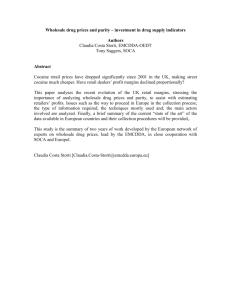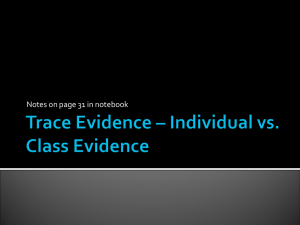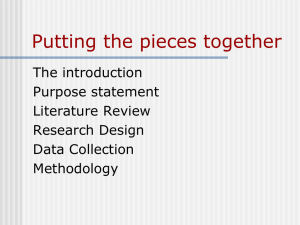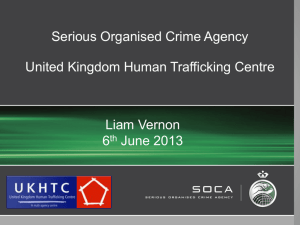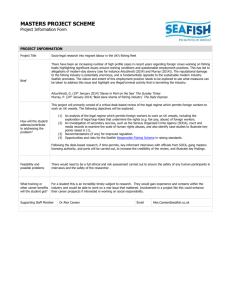serious-organised
advertisement
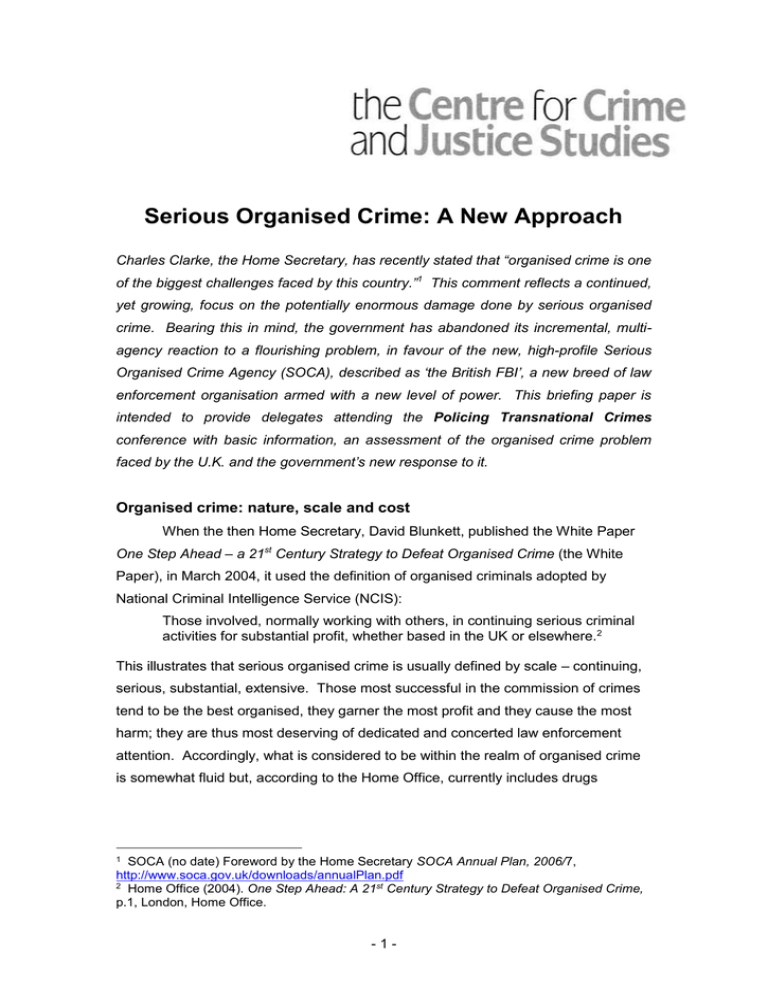
Serious Organised Crime: A New Approach Charles Clarke, the Home Secretary, has recently stated that “organised crime is one of the biggest challenges faced by this country.”1 This comment reflects a continued, yet growing, focus on the potentially enormous damage done by serious organised crime. Bearing this in mind, the government has abandoned its incremental, multiagency reaction to a flourishing problem, in favour of the new, high-profile Serious Organised Crime Agency (SOCA), described as ‘the British FBI’, a new breed of law enforcement organisation armed with a new level of power. This briefing paper is intended to provide delegates attending the Policing Transnational Crimes conference with basic information, an assessment of the organised crime problem faced by the U.K. and the government’s new response to it. Organised crime: nature, scale and cost When the then Home Secretary, David Blunkett, published the White Paper One Step Ahead – a 21st Century Strategy to Defeat Organised Crime (the White Paper), in March 2004, it used the definition of organised criminals adopted by National Criminal Intelligence Service (NCIS): Those involved, normally working with others, in continuing serious criminal activities for substantial profit, whether based in the UK or elsewhere.2 This illustrates that serious organised crime is usually defined by scale – continuing, serious, substantial, extensive. Those most successful in the commission of crimes tend to be the best organised, they garner the most profit and they cause the most harm; they are thus most deserving of dedicated and concerted law enforcement attention. Accordingly, what is considered to be within the realm of organised crime is somewhat fluid but, according to the Home Office, currently includes drugs 1 SOCA (no date) Foreword by the Home Secretary SOCA Annual Plan, 2006/7, http://www.soca.gov.uk/downloads/annualPlan.pdf 2 Home Office (2004). One Step Ahead: A 21st Century Strategy to Defeat Organised Crime, p.1, London, Home Office. -1- trafficking, immigration crime, particular types of fraud, and other related crimes such as armed robbery, money laundering and certain e- crimes.3 While the tag of ‘serious organised crime’ might properly be reserved for the acts committed by relatively few individuals when considering offending as a whole, according to the new Serious Organised Crime Agency (SOCA) “[i]t affects everyone”.4 Moreover, as David Blunkett stated in his foreward to the White Paper, “[o]rganised crime is big business”5 and, as such, comes with a huge economic cost. The White Paper detailed preliminary research conducted by the Home Office into the economic cost of organised crime and estimated that the price could be as high as £40 billion a year – the abuse of Class A drugs estimated at £13 billion a year “at a highly conservative estimate”; indirect tax fraud estimated at £7 billion annually; intellectual property theft estimated at £9 billion annually; and organised immigration crime estimated at £3 billion “at least”.6 Fraud against big business attracted only the estimation of “extremely large”.7 Although these figures might best be described as guesstimates that the Home Office has now scaled down8, organised crime operates on a vast scale if the government’s ‘knock-on effects’ theory is accepted – the cost of crime increases as the pyramid expands toward its base. Thus, it is estimated that 50 per cent of acquisitive crime – shoplifting, theft, vehicle crime and burglary – is committed by users of the Class A drugs cocaine and heroin.9 Hence, the government contends, reducing the organised trafficking of Class A drugs will reduce the quantity of drugs on the streets, increase the costs of these drugs and, eventually, lower the number of addicts committing crime to service their addictions.10 Terrorist offences are mentioned only in relation to organised crime’s funding of them and remain within the realm of the security and intelligence services. 4 SOCA (no date) Foreword by the Home Secretary SOCA Annual Plan, 2006/7, http://www.soca.gov.uk/downloads/annualPlan.pdf. 5 Home Office (2004), One Step Ahead: A 21st Century Strategy to Defeat Organised Crime, p.iii, London, Home Office. 6 ibid. at pp.8-9 7 ibid. 8 The joint statement by the Chair and the Director General of SOCA issued in its first annual plan argues that “[s]ome estimates put the economic and social costs of this harm at upwards of £20 billion a year – more than £300 for every person in the country” (SOCA (no date) Annual Plan 2006/7: 5). These figures were also used by the Home Secretary in a Joint SOCA/Home Office Press Release – Turning the Tide on Organised Crime, 055/2006, Monday 3 April, 2006. 9 Home Office (2002), The Government’s Drugs Policy: Is It Working? Cm 5573 London HMSO (The Government’s Reply to the Third Report from the Home Affairs Committee Session 2001-2002 HC 318 p. 5). 10 This theory has been disputed. For instance Steve Rolles recently noted that despite Home Office claims that more Class A drug dealers are being brought before the courts and 3 -2- Whilst it is easier to imagine the potential social ‘costs’ in the fear and exploitation involved in illegal immigration or the drugs trade, the White Paper’s assertion that organised crime causes or contributes to fear, anti-social behaviour and terrorism is harder to verify. These matters notwithstanding, it seems safe to say, as the government does, that “everyone pays – whether through higher prices in the shops to cover the cost of fraud or through their tax bill, because Government has to invest in enforcing the law or is itself defrauded.”11 Or to put it on a more human level: “Organised crime also damages the economy, impoverishing citizens and reducing the money available to finance key public services.” 12 Moreover, as the White Paper noted, due to trends in technology, population, and the world economy, the sphere of operational potential for organised crime is only likely to increase. Plastic card transactions in the UK have tripled since 1992; UK flights are expected to have increased by 40 per cent between 1998 and 2005; the number of goods vehicles travelling between the UK and mainland Europe increased by 80 per cent between 1992 and 2002; and the world population is expected to rise by approximately a third over the next 30 years – with 95 per cent of the increase occurring in the developing world.13 A new approach to the problems is perhaps more necessary now than ever. From past experience, a new strategy? Previously, the responsibility for dealing with serious organised crime has fallen to a number of different bodies. These were the National Criminal Intelligence Service, the National Crime Squad, HM Customs & Excise (responsible for investigation and intelligence in tackling serious drug trafficking and recovering related criminal assets), and the Home Office (responsible for immigration crime). Given the government’s line on the pervasive and highly damaging nature of organised crime, perhaps what is most surprising about the creation of SOCA is that it has taken so long. Charging four large organisations, not to mention the roles played by others such as MI514, and the Serious Fraud Office, with such a more drugs are being seized, Class A drugs are cheaper and more available than they ever have been. Rolles, S (2006) Drink and Drugs News,16 January 2006. 11 SOCA (no date) Foreword by the Home Secretary SOCA Annual Plan, 2006/7, http://www.soca.gov.uk/downloads/annualPlan.pdf. 12 Home Office (2004), One Step Ahead: A 21st Century Strategy to Defeat Organised Crime, p.1, London, Home Office. 13 Home Office (2004), One Step Ahead: A 21st Century Strategy to Defeat Organised Crime, p.10, London, Home Office. 14 MI5 has now passed on the remainder of its organised crime caseload to SOCA and will not take on new cases. -3- monumental task - given the potential for duplication, poor communication, inefficiency, and unhealthy competition – was unlikely to be effective. The Serious Organised Crime Agency SOCA, birthed by the Serious Organised Crime and Police Act 2005 (the Act), officially came into being on April 3, 2006. SOCA is “an intelligence-led agency with law enforcement powers”15 and its function is to detect, prevent, reduce and mitigate the harmful consequences of serious organised crime. Structure, Resources and Staffing SOCA is an Executive Non-Departmental Public Body (NDPB) and it is led by a board of ten with six non-executive members. The Board, appointed by the Home Secretary, is responsible for ensuring that the agency discharges its statutory functions and meets the priorities which are set by the Home Secretary.16 The Chair of the Board, also appointed by the Home Secretary, is Sir Stephen Lander, former director-general of MI5. He is responsible for SOCA’s overall approach, its relationship with ministers and for oversight of SOCA’s operational performance.17 The Director General of the Agency, Bill Hughes, formerly head of the NCS, is responsible for everything SOCA does operationally and administratively and is, once again, appointed by the Home Secretary.18 SOCA is divided into four directorates specialising in particular aspects of work: Intelligence: responsible for gathering and assessing information as well as building strong relationships with other agencies. Enforcement: responsible for providing a flexible operational response to threats and building criminal cases against targets. Intervention: responsible for “making life harder” for criminals with an emphasis on asset recovery and international work. Corporate services: responsible for supporting, facilitating and developing SOCA’s capabilities across 50 UK sites and internationally. 19 15 SOCA (no date) Foreword by the Home Secretary SOCA Annual Plan, 2006/7, p.6, http://www.soca.gov.uk/downloads/annualPlan.pdf. 16 ibid. 17 ibid. 18 ibid. 19 ibid. at pp.8-9. -4- For the financial year 2006/07, SOCA will receive grant in aid from the Home Office set provisionally at £416m in resource funding and £41m in capital provision. It anticipates employing approximately 4,200 full time equivalent staff during the year but this is expected to rise. SOCA has drawn its staff from those organisations it has replaced and therefore counts many former police officers in its ranks. Priorities and Focus SOCA’s priorities for its first year may be split into three overlapping categories: 1. those set by the Home Secretary; 2. sector priorities apportioning “operational effort” and largely determined by the active casework inherited from SOCA’s predecessor organisations; and 3. overarching “generic priorities” set by the board.20 The Home Secretary’s Priorities The Home Secretary set the following strategic priorities for SOCA: SOCA should devote a higher proportion of its resources and activity to intelligence work than the agencies that it replaces; Class A drugs and organised immigration crime, in that order, should be its top priorities; effort should continue to be devoted also to the other organised crime threats already identified, including fraud against individuals and the private sector, hi-tech crime, counterfeiting, the use of firearms and serious robbery; and emphasis should be placed on recovering the proceeds of crime.21 Sector Priorities The board has determined that SOCA should initially apportion its operational effort broadly as follows in the main threat sectors: 20 21 drugs trafficking, primarily Class A - 40% organised immigration crime - 25% individual & private sector fraud - 10% other organised crime - 15%22 ibid. at p.7; pp.9-10; p.11. ibid. at p.7. -5- The Generic Priorities SOCA’s Board has identified five priorities “to guide SOCA’s business”. These include ‘building knowledge’ (in part through “embedded officers” in other agencies and overseas), increasing collaboration (including with the private sector), and creating a system of “lifetime management” for serious organised criminals, in partnership with the National Offender Management Service.23 SOCA will also support the Child Exploitation and Online Protection Centre (CEOP), which is affiliated to SOCA but remains operationally independent. Powers In response to various debates concerning what powers SOCA officers would enjoy, the Act provides that the Director General of SOCA, or his delegate, may give ‘special powers’ when appropriate.24 Consequently, SOCA officers may at different times enjoy the powers of a police constable, customs officer, or immigration officer without necessarily being appropriately sworn or trained.25 The every day running of SOCA and the conduct of its officers and investigations are likely to be controlled by Codes of Practice. The Act provides that the Home Secretary may issue Codes of Practice, which must additionally be laid before Parliament unless doing so would be against the interests of national security, would prejudice the functions of SOCA or would jeopardise the safety of any person.26 SOCA’s general powers include the ability to institute criminal proceedings and cooperate with police forces and other law enforcement agencies.27 It is considered key to the success of the new agency that it will receive a dedicated prosecutorial service from a dedicated unit based within the Crown Prosecution Service.28 In addition, the Act introduces new powers (for use across all law enforcement agencies, but thought to be particularly valuable to the work of SOCA): 22 ibid. at p.11. ibid. at pp.10-11. 24 Home Office (2005), Serious Organised Crime and Police Act 2005, s43, London, Home Office. 25 The Act requires that staff first be given “adequate training” but does not specify, for example, that those given the powers of a police constable receive training equivalent to that of a police constable. 26 Home Office (2005). Serious Organised Crime and Police Ac 2005, s10, London, Home Office. 27 ibid. at s5. 28 The Times (2005), The Times Law Supplement, 22 November 2005, p.8, London, The Times. 23 -6- to compel individuals to answer questions in interviews with prosecutors and produce documents on demand; to strike deals with informants and convicted offenders to turn Queen's Evidence; to use enhanced powers of confiscation in respect of proceeds of crime investigations; and use Financial Reporting Orders which allow courts to impose obligations on people convicted of specified offences to report particulars of their financial affairs. Such powers presumably fulfil the White Paper’s stated goal that “[w]e will be looking to the new Agency, and the organisations with which it works, to be ‘lawfully audacious’”29. Strategy and Performance Assessment The Ministerial Committee on Organised Crime set up in September 2003, chaired by the Home Secretary, thought that to succeed in its battle against organised crime an attack on “three main fronts” was necessary: reducing the profit incentive, disrupting activities, and increasing the risk of doing criminal business. Arguably, the second of these two categories might be split between the first and the third and the whole strategy thus neatly reduced to one of an economic cost-benefit analysis. Increase the likely cost, reduce the likely benefit. Simple. Intelligence-led, collaborative and harm-based To achieve this end, SOCA will rely on three key principles that set it apart, at least to some degree, from the previous law enforcement approach to organised crime. First, SOCA is avowedly intelligence-led. Much of the emphasis is upon gathering information on, and increasing current understanding of, organised crime networks and the manner in which they operate. Ingrained in the ethos of the organisation is the idea that future successes will only be possible if much is done to increase intelligence now. Furthermore, key positions on SOCA’s board are filled by former officers from the security and secret intelligence communities. As noted above, Sir Stephen Lander (former director general of MI5) heads SOCA’s board, David Bolt (formerly of MI5) is SOCA’s Director of Intelligence, and Paul Evans (formerly of MI6) is SOCA’s Director of Intervention. Second, much weight has been given to the importance of successful collaboration if SOCA is to achieve its goals. As mentioned, built into the priorities 29 Home Office (2004), One Step Ahead: A 21st Century Strategy to Defeat Organised Crime, p.4, London, Home Office. -7- and structures of SOCA are mechanisms to facilitate collaboration both with law enforcement within the United Kingdom and internationally. It is apparent from the first SOCA Annual Plan that the fostering of a culture of cooperation is considered intrinsic to SOCA’s success. The Act itself also attempts to reduce the potential for organisational conflict. For example, if conduct being investigated involves serious or complex fraud, SOCA may continue its investigation if the Serious Fraud Office agrees or declines to act on the matter itself.30 The same rule applies with regard to HM Revenue and Customs when investigating revenue fraud.31 Promoting collaborative work is, of course, only sensible since competition between agencies, as happened in the past, will only harm the effort to tackle organised crime. Third, what is different with the SOCA approach is its resort to concepts of harm and harm-reduction as a goal, rather than the oft preferred numerical measures of criminals caught, drugs and goods seized, years sentenced, and money saved. “So, the Government has set a straightforward objective: to reduce significantly the harm done to the UK and its citizens by organised crime”.32 The objective might indeed be straightforward, but the means for assessing the government’s success in achieving it is less clear. Instead of setting performance-based targets, as has been this government’s consistently preferred measure in criminal justice and other public sector bodies, it has opted for something far more ethereal. Performance Assessment The SOCA Annual Plan cites “a performance regime that bears as closely as possible to the reality of outcomes that matter to the people of this country”.33 Though the plan does mention other measures which enshrine the principles of intelligence and collaboration, these are similarly vague. Most worrying is that SOCA is responsible for its own performance assessment and, coupled with these nebulous measures, this is unlikely to provide any indication one way or the other as to whether SOCA is doing its job and is tax revenue well spent. 30 Home Office (2005), Serious Organised Crime and Police Act 2005, s2(3), London, Home Office. 31 ibid., s2(4). 32 Home Office (2004), One Step Ahead: A 21st Century Strategy to Defeat Organised Crime, p.3, London, Home Office. 33 SOCA (no date), Foreword by the Home Secretary, SOCA Annual Plan, 2006/7, p.6, http://www.soca.gov.uk/downloads/annualPlan.pdf. -8- Trouble Ahead The need for the creation of SOCA, or something similar, has in principle enjoyed widespread support from across the political spectrum to the extent that it seems that if SOCA did not exist, it would be necessary to invent it. SOCA’s Profile and the Need for Success The creation of SOCA continues New Labour’s focus on criminal justice, its related organisations and their expansion and reform, and it will be interesting to see whether SOCA will result in a net loss to the Exchequer. Furthermore, when structural reform and a new agency are introduced to the public with such political vim and media exposure, the public will and should expect results. The creation of the international, untouchable, jet-setting, ‘Mr. Big’ of the organised criminal underworld in the public consciousness will necessitate his capture although such people, if they do exist, are notoriously hard to ensnare and initial successes are more likely to be more low-key. The Gift of Power The Act’s gift of yet further law enforcement power is not straightforward. The new power compelling individuals to disclose information is susceptible to challenge under Article 6(1) of the European Convention of Human Rights, which confers a right to remain silent and against self-incrimination. Despite the new importance given to the provision of Queen’s evidence, ‘snitch testimony’ is unlikely to net key players. Additionally, as its extensive use in the United States has shown, it often leads to unsafe convictions secured by the lies of people themselves waist-deep in criminality and deceit and seeking leniency by blaming others. Moreover, SOCA agents, or officers, will posses politically-bestowed powers that morph according to situation and blur the recognised distinctions between the secret service and intelligence agencies and more traditional law enforcement organisations. As Bowling and Ross note, the agency will have use of ‘unprecedented surveillance, intrusion, and coercion powers’ and without robust mechanisms for oversight and accountability the exercise of these powers might create problems.34 34 Bowling, B. & Ross, J. (2006), SOCA: The Serious & Organised Crime Agency, Criminal Justice Matters, p.9, No. 63 Spring 2006,.London, Centre for Crime and Justice Studies. -9- Governance, Accountability and Transparency SOCA will not enjoy the operational independence or relative insulation from political interference enjoyed by the police in the United Kingdom. With the management of a Director General and the oversight of a non-executive board all appointed by the Home Secretary, coupled with the discretionary grant of SOCA’s potentially extensive, special, ad hoc powers resting with the Home Office, the organisation - management and agent alike - is open to political use and abuse. This is made all the more worrying when considering the recognised intent and capacity of organised crime to corrupt and influence. As Bowling and Ross state: “[r]obust measures protecting SOCA from outside influences would have been desirable.”35 SOCA’s day to day running and collective conduct will be controlled by Codes of Practice issued by the Home Secretary and not a politically-independent body. The often covert work of the agents will likely be performed in a legal and moral twilight unprotected and unencumbered by the police officer’s sworn allegiance to the Crown and initially uncontrolled by clearly enunciated legal precedent. Consequently, trust and confidence based upon transparency, integrity, scrutiny and oversight will be of quintessential importance to SOCA’s work. Yet, leaving scrutiny and oversight to the soon-to-be merged HM Inspectorate of Constabulary, and the Independent Police Complaints Commission, itself so easily barred from the scene of the killing of Jean Charles de Menezes and embroiled in the resultant controversy, inspires scant confidence. Additionally, in light of the positioning of secret intelligence officials at the top of a criminal justice organisation and the growing perception that traditional civil liberties are being eroded by Labour government action,36 these issues will likely receive renewed scrutiny. Conclusion Ultimately, it will be difficult for SOCA, acting both nationally and transnationally, to prove convincing evidence that it has achieved a reduction in the harm caused by serious organised crime.37 Public confidence may be difficult to capture, given the weak mechanisms of accountability and oversight, far-reaching 35 Bowling, B. & Ross, J. (2006), SOCA: The Serious & Organised Crime Agency, Criminal Justice Matters, p.36, No. 63 Spring 2006,.London, Centre for Crime and Justice Studies. 36 When announcing the ‘opening’ of SOCA, Tony Blair stated: “There is absolutely nothing that should become before the basic liberties of people in this country to be freed from the tyranny of organised crime.” Independent, April 4, 2006, p.24. 37 For example, since class A drugs are already identified as its 40 per cent priority and have been so resolutely impervious to governmental supply-based targeting before – even by the comparatively gargantuan manpower, resources, and powers of organisations such as the FBI and Drug Enforcement Agency. - 10 - powers, and politically appointed leadership of this criminal justice organisation. Whether and how these issues are overcome will largely determine SOCA’s success in the fight against the growing threat of serious organised crime. For further information, please contact: Chris Eades, Policy and Information Officer Centre for Crime and Justice Studies The School of Law, King’s College London chris.eades@kcl.ac.uk 020-7848-1690 - 11 -
